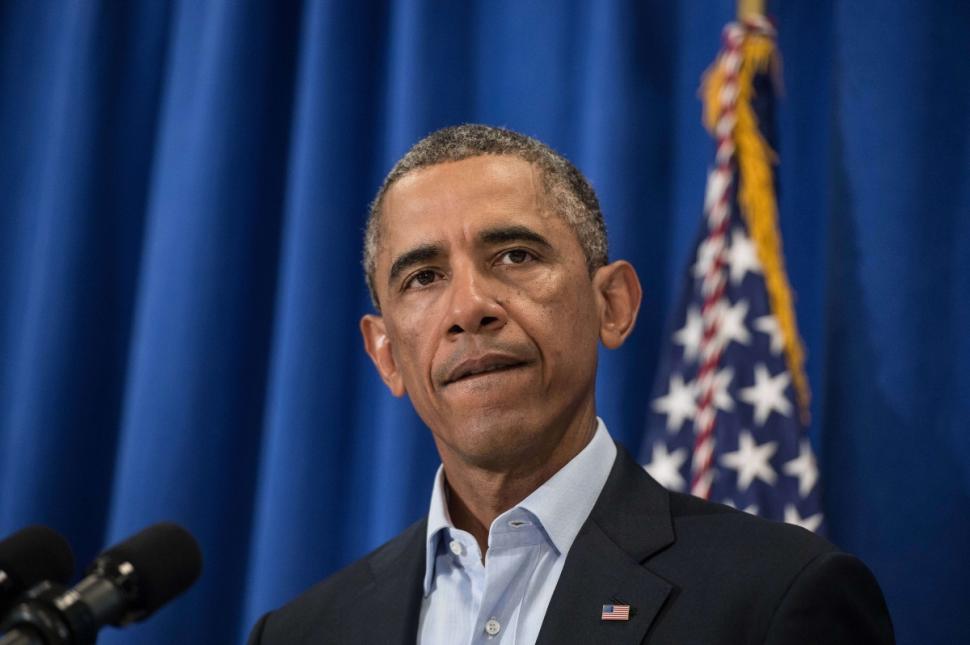
Wednesday August 27, 2014
Obama's inaction and inattention have helped fuel the current chaos

Chaos is engulfing the Middle East and North Africa. Islamicist militias have just captured the international airport outside Tripoli, Libya’s capital, after a protracted struggle.
More accurately, we should refer to “what once was Libya,” because the country’s collapse is now so advanced that its nominal government is almost invisible. U.S. diplomats withdrew from Tripoli last month, memories of Benghazi Sept. 11, 2012, front and center.
And now we hear that Egypt and the UAE have intervened in Libya militarily without telling us first, an almost unprecedented action by U.S. allies.
We are still reeling from James Foley’s barbaric murder, but his tragedy has a larger import. Much of the region has lost any semblance of basic law and order. Nonetheless, already we hear Americans saying, as Neville Chamberlain did of Czechoslovakia in 1938, that it involves “a quarrel in a far away country between people of whom we know nothing.”
Inevitably, however, like it or not, the Middle East’s problems will become our problems.
Libya’s fragmentation is merely one example. Iraq was already fissioning into three separate states, and Syria’s hostilities launched it toward partition over three years ago. Both nations’ descents have been accelerated by U.S. inattention.
Today’s rise of the “Islamic State” (previously ISIS) is the next logical step: As existing nations are dismembered, new ones arise from the pieces.
There is more. Somalia’s national government effectively disintegrated 25 years ago, replaced by Islamist militias and modern-day pirates. Yemen remains convulsed by tribal and regional warfare, its capital now besieged by Houthi rebels. Sudan and the newly independent South Sudan are constantly at risk of new hostilities between them.
Egypt has largely lost control of the Sinai Peninsula to terrorists and smugglers, benefitting Hamas in Gaza. Egypt’s military government is again cracking down hard on the Muslim Brotherhood, but given its long history of resilience, no one should believe it is finished for good.
Nigeria’s Boko Haram is kidnapping Christians and attacking government offices, and terrorists roam freely throughout Mali, Niger and southern Algeria.
Such anarchic conditions provide safe havens for terrorists, warlords and thugs. While for now the chaos is localized, the risk is very real it will spread to the oil-rich Arabian Peninsula and beyond.
If the region’s oil production is seriously disrupted, or worse, falls into the hands of radical regimes, as is already true in Iran, America’s economy will be seriously threatened — whether or not they ever launch terrorist attacks against our homeland.
Yet as Middle Eastern disorder grows, America has remained largely passive. Indeed, President Obama previously trumpeted that he was “pivoting” from the region toward Asia. Accordingly, his administration had withdrawn our military forces from Iraq, and is poised to do so in Afghanistan.
Instead of actively working to protect U.S. interests across the region, Obama focused on two delusions: First, trying to negotiate Iran’s ayatollahs out of their nuclear-weapons program; and second, believing that a stable and secure peace was possible between Israel and Palestinians dominated by Hamas terrorists and the corrupt, incompetent Palestinian Authority.
In pursuing these unachievable, unrealistic goals (while displaying inept diplomacy), one might say Obama has been fiddling around. One can certainly say that the Middle East and North Africa are burning.
What the United States should do first is expunge the notion that we have the luxury of pivoting anywhere. Whether Obama appreciates it or not, America’s interests are global and our attention span and capabilities must be global as well.
Active U.S. involvement is necessary on a continuing basis, not just when the fire erupts, because then it is too late to prevent significant damage. We are not talking here solely or even primarily about military power, but rather sustained political attention and leadership. Advancing U.S. interests requires large amounts of hard, often tedious work — “gardening,” as former Secretary of State George Shultz called the unglamorous job of preventing crises before they emerge.
America immediately needs a vigorous public debate over our involvement in the Middle East, and indeed in the world at large.
We have too long suffered under the perception that voters do not care about these issues because foreign affairs do not directly affect our way of life here at home. This erroneous and dangerous belief, fed by our President, must change.